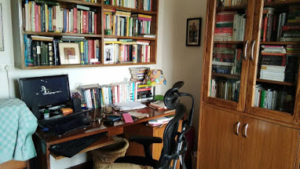Saikat Majumdar’s “The Scent of God”
Academic and writer Saikat Majumdar’s novel The Scent of God is set in an elite all-boy’s boarding school run by a Hindu monastic order in late-twentieth century India. On the surface of it, it is seemingly a strictly run institution where discipline matters. Academic excellence is combined with the spiritual learnings that are to be learned every day so as to ensure the students are exemplary exam warriors. Yet despite these strict rhythms to the day the students will have their moments of challenging authority or testing limits. The opening pages of the novel focuses on the eleven-year-olds Anirvan and Kajol. And it is from there the plot begins. Read an excerpt Outlook magazine published in January 2019.
Saikat Majumdar’s previous novel Firebird was absolutely amazing to read. It was sharp and used words sparingly. It was a fine example of craftsmanship. Unfortunately The Scent of God does not live up to the expectations one has of Saikat Majumdar’s fiction. Though the premise of writing a same sex novel is a great idea but fictional landscapes also need to be cautious in how these characters are portrayed. Despite the apparent sensitivity with which the author tackles the plot in The Scent of God, it is the lack of literary awareness about the spunk and boldness in contemporary queer adolescent fiction that strikes a jarring note. It is apparent not only in the very adult-like conversations that the eleven year olds engage in but also their explorations of gauging their attraction for each other. There is a tentativeness in the prose that is usually missing in the current crop of young adult fiction. Perhaps The Scent of God is meant for the adult trade market but a little understanding of the young adult literature market that is maturing rapidly in this particular genre would have helped enrich this novel. A truly tremendous imprint is Scholastic’s PUSH imprint that is being led by the impressive David Leviathan. Or this online discussion forum about yalit — I Read YA — that too has animated conversations about queer literature meant for adolescents.
Nevertheless The Scent of God will be regarded as a significant novel to emerge in contemporary Indian fiction for its attempts to tackle a gender sensitive issue and for its excellent timing. It has been published months after the Supreme Court ended Sec 377 thereby decriminalising homosexuality. While there is legal recognition the deep seated social prejudice towards the queer community continues to exist and this will take a long time to combat. So novels like The Scent of God will play an essential role in contributing to the discourse by addressing taboo subjects such as sexual freedoms in a rabid fundamentalist society and exploring how does an individual exercise their free will? The Scent of God will also remain in public view for its very catching cover. It is a bold design by Pinaki De and in all likelihood will be recognised with a listing at a book cover prize.
11 February 2019

